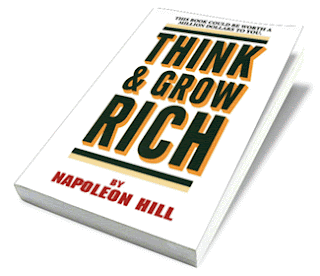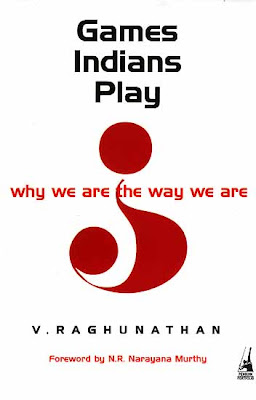BOOK REVIEW: Think and grow rich
 Author: Napolean Hill
Author: Napolean HillPrice: 150 INR
Its been long time since I stopped reading motivational or self-help books. I used to read them during my school days to 'pep-up' myself during examinations.Recently one of my mentors requested me to read this book 'Think and grow rich' by Napoleon Hill and found it different from typical motivational books. The Author Napoleon came up with this book based on his 25 years of experience in studying success philosophy, inspired by Dale Carnegie.
This book consists of thirteen principles for becoming 'rich'. The author describes 'rich' not only in terms of accumulating material wealth but also in-tangible wealth -- in terms of success, accomplishment, love, peace, courage, purpose, happiness and contribution. To be very honest, I found the initial chapters as boring and it was covering typical motivational topics -- imagination, auto-suggestion, having a purpose in life, daily to-do list etc.
The later chapters got much more interesting when the author started focusing on real life examples and some philosophical explanations. In the chapter on DECISION, the example of Richard Henry Lee and his famous proposal to congress on June 7, 1776: 'That these United Colonies are,and of right ought to be,free and independent States' was good. The story followed after this proposal was quite inspirational and makes is really interesting to read. Followed by that I liked chapter 10, which talks about 'power of master mind'. The author defines the term of 'master mind' as: 'Co-ordination of knowledge and effort in a spirit of harmony between two or more people for the attainment of a definite purpose'. As the world is becoming more and more interdependent, it makes sense to collaborate with like-minded people to accomplish anything significant. In this chapter the author covers the power of coming together as each one in the team positively influence each other to achieve the common goal. Followed by that the author covers the 'infinite intelligence' which he defines it as: 'The source of knowledge experienced through creative imagination'.
The highlight of the book was chapter 13, THE BRAIN, which talks about the scientific aspects of human brain as follows:
'It has been determined that there are from 10,000,000,000 to 14,000,000,000 nerve cells in the human cerebral cortex and we know that these are arranged in a definite patterns. These arrangements are not haphazard. They are orderly. Recently developed methods of electro-physiology grow off action currents from precisely located cells or fibers with micro-electrodes amplify them with radio tubes and record potential differences to a millionth of a volt.
It is inconceivable that such a network of intricate machinery should be in existence of the sole purpose of carrying on the physical functions incidental to growth and maintainability of the physical body. It is not likely that the same system, which gives billions of brains cells that media for communication one with another, provides, also the means of communication with other intangible forces?'
This is one of the points where the author interfaces with the philosophy, from the motivational landscape. In my previous blog about 'personal experiences with yoga' I have experienced somewhat similar stuff the author is talking about.
Overall it pretty good motivational and philosophical book.
This book consists of thirteen principles for becoming 'rich'. The author describes 'rich' not only in terms of accumulating material wealth but also in-tangible wealth -- in terms of success, accomplishment, love, peace, courage, purpose, happiness and contribution. To be very honest, I found the initial chapters as boring and it was covering typical motivational topics -- imagination, auto-suggestion, having a purpose in life, daily to-do list etc.
The later chapters got much more interesting when the author started focusing on real life examples and some philosophical explanations. In the chapter on DECISION, the example of Richard Henry Lee and his famous proposal to congress on June 7, 1776: 'That these United Colonies are,and of right ought to be,free and independent States' was good. The story followed after this proposal was quite inspirational and makes is really interesting to read. Followed by that I liked chapter 10, which talks about 'power of master mind'. The author defines the term of 'master mind' as: 'Co-ordination of knowledge and effort in a spirit of harmony between two or more people for the attainment of a definite purpose'. As the world is becoming more and more interdependent, it makes sense to collaborate with like-minded people to accomplish anything significant. In this chapter the author covers the power of coming together as each one in the team positively influence each other to achieve the common goal. Followed by that the author covers the 'infinite intelligence' which he defines it as: 'The source of knowledge experienced through creative imagination'.
The highlight of the book was chapter 13, THE BRAIN, which talks about the scientific aspects of human brain as follows:
'It has been determined that there are from 10,000,000,000 to 14,000,000,000 nerve cells in the human cerebral cortex and we know that these are arranged in a definite patterns. These arrangements are not haphazard. They are orderly. Recently developed methods of electro-physiology grow off action currents from precisely located cells or fibers with micro-electrodes amplify them with radio tubes and record potential differences to a millionth of a volt.
It is inconceivable that such a network of intricate machinery should be in existence of the sole purpose of carrying on the physical functions incidental to growth and maintainability of the physical body. It is not likely that the same system, which gives billions of brains cells that media for communication one with another, provides, also the means of communication with other intangible forces?'
This is one of the points where the author interfaces with the philosophy, from the motivational landscape. In my previous blog about 'personal experiences with yoga' I have experienced somewhat similar stuff the author is talking about.
Overall it pretty good motivational and philosophical book.

Comments